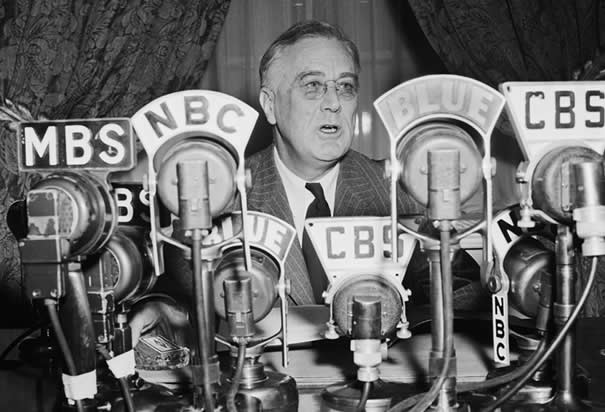
FDR Flashes the Victory Sign, 1942
Franklin Delano Roosevelt (1882-1945), the 32nd President of the United States, at his estate in Hyde Park, New York.
Photo Credit: Keystone/Getty Images
The Great Depression, the worst crisis in American history, brought the country to its knees by 1933 when Franklin Roosevelt took office. FDR and his team launched the New Deal to help get the country back on its feet. They succeeded, yet the myth persists that the New Deal had little effect on economic recovery and only World War II ended the Depression.
The proximate cause of the Great Depression was the financial meltdown that began in October 1929. Stock prices nosedived, millions defaulted on mortgage payments, and thousands of businesses and banks were shuttered.
The real economy was going into recession well before Black Friday, when all hell broke loose. Investment shrank, wages were slashed, layoffs multiplied, and consumer demand shriveled, propelling the economy into a downward spiral. By early 1933, GDP had fallen by half, industrial output by a third, and employment by one-quarter.
A key accomplishment of the New Deal was to get the U.S. financial house in order. Failing banks were culled, deposit insurance instituted, homeowners bailed out, and mortgages guaranteed. The Federal Reserve loosened up the money supply and credit began to flow again.
Meanwhile, billions were pumped into the economy through emergency relief funds and public works programs, from the CCC to the WPA. Not only were millions of desperate American put to work, their families had spending money to stimulate aggregate consumption.
Furthermore, federal spending shot ahead of tax revenue, creating a large budget deficit. FDR didn’t believe in deficits, but was willing to try anything, thus inventing ‘fiscal policy’ even before economist John Maynard Keynes gave it a name.
The economy took off, reaching double-digit growth rates. By 1937, the Great Recovery had pushed output, income, and manufacturing back to 1929 levels. Then recession hit in 1937-38, dropping output by a third and driving unemployment back up. Three things contributed to the setback: FDR tried to re-balance the budget; Social Security taxes kicked in; and the Federal Reserve tightened money supply.
Nevertheless, growth resumed in 1939 and regained its long-term trajectory before war broke out. The big exception was unemployment, which stayed above 10 percent, forever marring the New Deal’s reputation. Worse, a key study exaggerated joblessness by not counting the millions working in federal work programs.
World War II brought full employment through military recruitment and full-tilt production, with the federal government running more massive deficits than the New Deal ever dared.
To be sure, recovery cannot be ascribed only to the New Deal. By the 1920s, the American economy was the largest in the world and the assembly line, electricity, chemicals, and petroleum had unleashed a new Industrial Revolution. Advances in productivity continued through the 1930s. Dramatic improvement in transportation was helped by the New Deal’s extensive road building. The downside was closure of obsolete factories and railways, terminating millions of jobs, which explains much of the unemployment that remained despite the Great Recovery.


Should those working the WPA & other gov programs be counted as employed when judging the state of the economy? I don’t think so. They were temp workers and few in the government thought of the jobs as permanent regular positions. As long as they thought that, these people were really unemployed and the NDeal could not be judged a success until they had regular positions in government and the private sector.
I find that adopting the sophistry of yesterdays or today’s speculative financier paid spokesman or propagandists constitutes a mental trap that FDR so effectively skewered when he went after the mad chase of profit versus the true constitutional principle of happiness and achievement. According to those former Wall Street mouthpieces such as Time magazine all throughout the 1930’s proclaimed that Hitler or Mussolini was considered a success because of their ruthlessness in crushing Unions and Communist movements. Today, success is defined by how much the Enrons, Ubers, and Goldman Sachs of today profit from the looting of states, communities, people and the lowering of living standards.
Mr. Stricker should consider that for every dollar spent on a person employed on building a road, sewer, post office, hydro electric dam, and school also employed people in the private sector, both in the supplying of materials for the projects and the various community services that people use such as grocery stores and barbers. Not to mention also, the permanent effect in what they built that has lasted since that time, an attitude perhaps that has been drowned out by the Baby Boomers and their cult of ME ME ME, and the throwaway consumer economy with its built in planned obsolesence.
Strictly speaking, if a person who was formally on the dole, was then hired, whether by the P.W.A., CCC, or C.W.A. on a road project for instance, he was employed, no matter if lying bastards like Amity Shlaes would try to twist things in such a manner to say that because of the nature of the employer, i.e. the Federal Government, then by default, means that the person was in reality not employed. Face it, the captains of casino finance who never gave up slandering FDR even before he stepped in the White House have equated his efforts and protection of the general welfare (his job according to the Constitution) with Communism and Socialism. 70 years of Big Lie tactics does work to a degree when people come on a website such as this and take sides with the enemy.
The total disposition put upon the economy by the stock market crash can not be compared to any other in American history. FDR’s programs helped tremendously, however did not fully bring about the end of the Great Depression. That can accolade can be some what attributed to the global conflict World War Two.